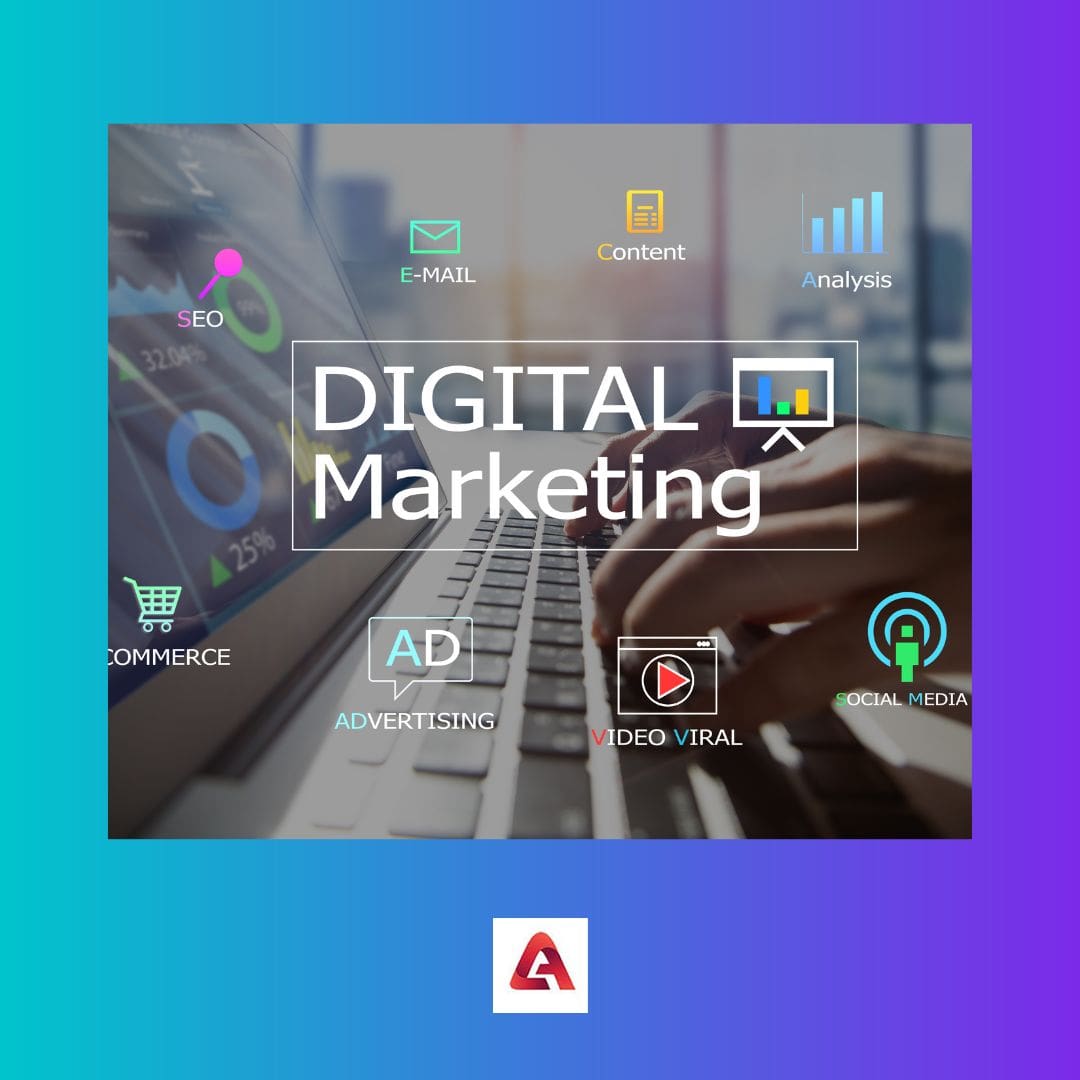With more and more people availing of Internet services, companies and business owners are introducing their products and services to the digital space to reach the broadest range of audiences.
Accordingly, they utilize digital mediums like websites, web pages, search engines, emails, mobile applications, social media platforms, and many more to promote their brand products and services.
The aim is not only to reach but also to pervade the digital life of their target audience with their brand name.
Digital Marketing is a marketing method employed by companies and business owners for the publicity and advertisement of their services and products.
It essentially entails utilizing a wide range of digital channels like websites, applications, emails, and others to reach and saturate the everyday online life of the target consumers.

Key Takeaways
- Digital marketing uses digital channels and technologies to promote products or services and build brand awareness.
- Digital marketing includes various activities such as search engine optimization, social media, email, and content marketing.
- Digital marketing allows businesses to reach a wider audience, measure the effectiveness of their campaigns, and target specific customer segments.
How does Digital Marketing work?
First, it is crucial to note that digital marketing may offer internet services. However, it is not the same as internet marketing.
Internet marketing entails promotion through or on the Internet only. In contrast, digital marketing employs mediums like subway platforms, mobile devices, mobile applications, or simple video games.
Two significant characteristics that essentially define digital marketing include:
- Targeting a particular section of the consumer base.
- Two-way communication between the advertisers (sources) and the consumers (receivers).
Advertisers or sources study consumer or receiver behavior and segregate them into different segments to enunciate it more elaborately. Subsequently, they target these well-defined segments or receivers with ads encouraging them to subscribe to their services and products.
For example, fashion & retail companies come with various discount offers during festive seasons to encourage people to purchase their services and products. They know this is when people, especially the youngsters and women of the house, will shop a lot. Correspondingly, they target their receivers with email ads, search result ads, messages on social media platforms frequently visited by them, and the like.
Channels of Digital Marketing
Digital marketing as a marketing method employs the following channels to promote a company’s services and products.
- Content Marketing entails generating suitable content for brand promotion, lead collection, traffic, and customer growth. Blogs, podcasts, ebooks, webinars, and online courses are the primary mediums of this kind of marketing.
- Website Marketing: It is the primary channel of digital marketing. However, it depends on other digital marketing strategies to make a company’s online presence felt by the internet scrollers.
- PPC (Pay-Per-Click) Advertising: It allows a company to reach its consumer base via paid advertisements on various online platforms like Google, Facebook, Instagram, Twitter, LinkedIn, Bing, and the like. Google and Facebook ads are some of the most favored paid ad platforms.
- Email Marketing: Companies use emails to interact with their potential customers by providing discounts, notifications of various events, and links to their websites.
- SMS Messaging: Companies also send SMS messages to interact with and notify consumers of their products, events, and discounts.
- Social Media Marketing: Many people use social media platforms, and companies target these spaces to promote their brands and collect leads.
- Video Marketing: Online video-sharing platforms like Youtube have become very popular. People do not want to purchase any service or product unless they have seen its reviews by independent vloggers. As such, it has become almost indispensable for companies to establish a prominent presence on these platforms.
- Affiliate Marketing: Companies also roll out affiliate programs and pay affiliate marketers to promote and sell their services and products on digital platforms.
Advantages of Digital Marketing
The following are the advantages of digital marketing over other marketing methods:
- Wider reach: Digital marketing allows business owners and companies to trace and reach new customers and markets with a meager investment.
- Direct interaction with a consumer base: Two-way interaction is an essential feature of digital marketing. This characteristic of digital marketing allows company owners to connect to their customers directly and cater to their needs and wants.
- Cost-effective: Digital Marketing allows companies to reach diverse consumer bases with less investment than traditional marketing methods.
- Enhancement conversion rate: Unlike other marketing methods, digital marketing allows potential customers to purchase a product or service with just a few clicks.
- Trackable Outcomes: With metrics like web analytics, digital marketing outcomes are easy to measure.
Disadvantages of Digital Marketing
Just like all other marketing methods, digital marketing has its limitations. These include:
- Requires skilled personnel: Digital marketing is profoundly trends and technology-dependent. Consequently, highly skilled personnel with appropriate knowledge and the rigor to remain updated is needed.
- Time-consuming: Digital marketing involves tasks like creating and optimizing content, which requires time and constant engagement.
- High level of competition: Digital marketing provides a company with a global reach which also implies global competition. Companies need to be extremely innovative and practical in such tough competition.
- Privacy and security issues: Digital marketing depends on consumer information which entails a vast range of legal and regulatory matters. Compliance with digital and privacy laws is necessary for a company to earn credibility and reputation.
- Swift tarnishing of brand name: Data flows much faster in digital space. Consequently, a single negative feedback can tarnish a brand name within minutes.


